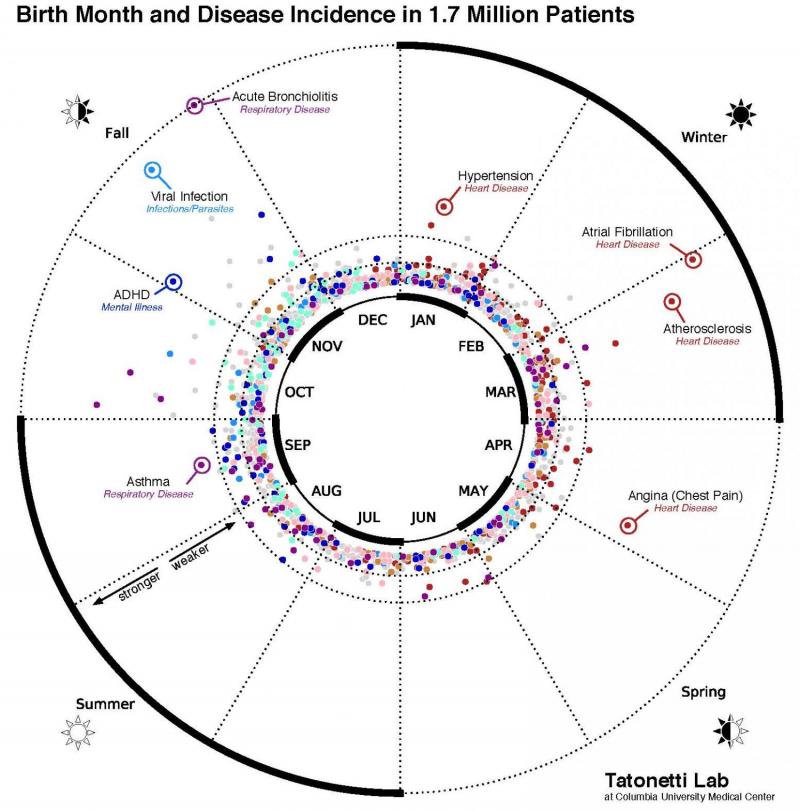Data scientists find connections between birth month and health
- by 7wData

This data visualization maps the statistical relationship between birth month and disease incidence in the electronic records of 1.7 million New York City patients. Credit: Dr. Nick TatonettiColumbia University scientists have developed a computational method to investigate the relationship between birth month and disease risk. The researchers used this algorithm to examine New York City medical databases and found 55 diseases that correlated with the season of birth. Overall, the study indicated people born in May had the lowest disease risk, and those born in October the highest. The study was published in the Journal of American Medical Informatics Association.
"This data could help scientists uncover new disease risk factors," said study senior author Nicholas Tatonetti, PhD, an assistant professor of biomedical informatics at Columbia University Medical Center (CUMC) and Columbia's Data Science Institute. The researchers plan to replicate their study with data from several other locations in the U.S. and abroad to see how results vary with the change of seasons and environmental factors in those places. By identifying what's causing disease disparities by birth month, the researchers hope to figure out how they might close the gap. Earlier research on individual diseases such as ADHD and asthma suggested a connection between birth season and incidence, but no large-scale studies had been undertaken. This motivated Columbia's scientists to compare 1,688 diseases against the birth dates and medical histories of 1.7 million patients treated at NewYork-Presbyterian Hospital/CUMC between 1985 and 2013. The study ruled out more than 1,600 associations and confirmed 39 links previously reported in the medical literature. The researchers also uncovered 16 new associations, including nine types of heart disease, the leading cause of death in the United States. The researchers performed statistical tests to check that the 55 diseases for which they found associations did not arise by chance. "It's important not to get overly nervous about these results because even though we found significant associations the overall disease risk is not that great," notes Dr. Tatonetti. "The risk related to birth month is relatively minor when compared to more influential variables like diet and exercise."
The new data are consistent with previous research on individual diseases. For example, the study authors found that asthma risk is greatest for July and October babies. An earlier Danish study on the disease found that the peak risk was in the months (May and August) when Denmark's sunlight levels are similar to New York's in the July and October period. For ADHD, the Columbia data suggest that around one in 675 occurrences could relate to being born in New York in November. This result matches a Swedish study showing peak rates of ADHD in November babies. The researchers also found a relationship between birth month and nine types of heart disease, with people born in March facing the highest risk for atrial fibrillation, congestive heart failure, and mitral valve disorder. One in 40 atrial fibrillation cases may relate to seasonal effects for a March birth. A previous study using Austrian and Danish patient records found that those born in months with higher heart disease rates—March through June—had shorter life spans. "Faster computers and electronic health records are accelerating the pace of discovery," said the study's lead author, Mary Regina Boland, a graduate student at Columbia. "We are working to help doctors solve important clinical problems using this new wealth of data."
[Social9_Share class=”s9-widget-wrapper”]
Upcoming Events
Shift Difficult Problems Left with Graph Analysis on Streaming Data
29 April 2024
12 PM ET – 1 PM ET
Read MoreCategories
You Might Be Interested In
Brazilian Data Visualization Platform Brings Open Data To Life
23 Jun, 2015Governments around the world have released more than a million open data sets over the last decade. Analyzing that data …
Speeding up extreme big brain data analysis
6 Nov, 2015It’s tough to unravel the mysteries of the brain when your computer is frozen. To aid frustrated brain researchers, a …
7 most common data visualization mistakes
4 Jun, 2015Stacked In dataviz, as in any other field, there are rules, best practices, guidelines and then there is common sense. …
Recent Jobs
Do You Want to Share Your Story?
Bring your insights on Data, Visualization, Innovation or Business Agility to our community. Let them learn from your experience.
Privacy Overview
Get the 3 STEPS
To Drive Analytics Adoption
And manage change




